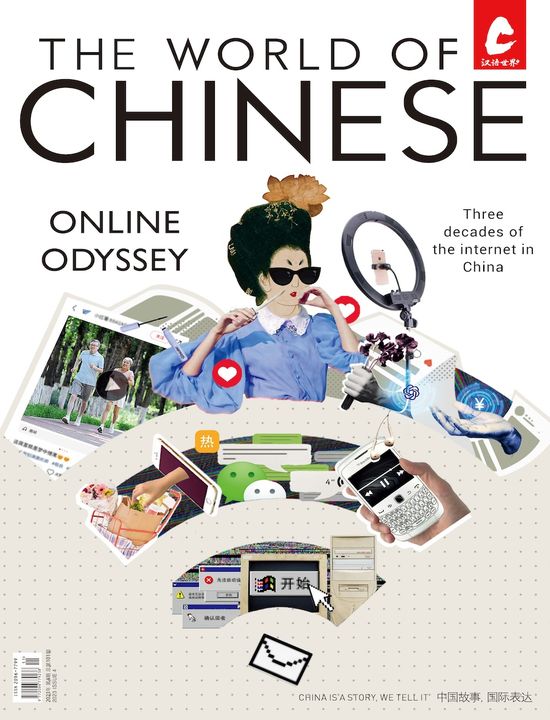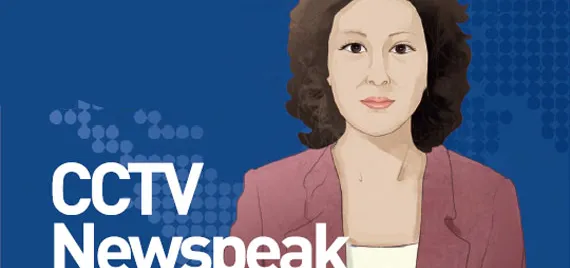See you tomorrow at the same time…forever
Living in China, it’s hard to miss CCTV’s Network News at seven o’clock, or 新闻联播 (Xinwen Lianbo). During the 30-minute program, your remote will be rendered useless. Central, provincial,city, and county channels—everywhere you turn, the authoritarian voices of the news anchors follow, defining the important issues of the day and leading the discussion. For 36 years, CCTV news has been the faithful voice of the government and the Party. And just like the last words of each episode: 同一时间,明天再见! (Tong yi shijian, mingtian zaijian!See you tomorrow at the same time!), it will probably never end. Unplugging the TV wouldn’t help either, because anything that’s been on the CCTV news will still hit every newspaper the next morning. Kiss your hope of hiding from the program goodbye and start to embrace it like everyone else. But, just because biased, saccharine bile is being crammed in your face like something out of a dystopian film, it doesn’t mean you can’t still have a good laugh, like watching clueless journalists going around asking people if they are happy (你幸福吗?Ni xingfu ma?). More importantly, the program may accidentally shed some light on your understanding of contemporary China.
To understand CCTV news, you will first have to master its language. Since there’s little room for ad-lib, all the anchors have to do is read the teleprompter. To make things even easier, the reports are very, shall we say, economical—they recycle words and expressions. Though the day to day issues may vary, the language used to describe them stays roughly the same. Switch a few people and places, you will end up with a brand new report. In addition, news value or the order of reports is often defined by the levels of position of the officials involved. Therefore, the top of the order always concerns top leaders of state. The first and most important news may go as follows:
The chairman met with the Republic of Korea president in Diaoyutai State Guesthouse; the two parties carried out an affable and friendly discussion.
Guójiā zhǔxí zài diàoyútái guó bīnguǎn huìjiànle hánguó zǒngtǒng, shuāngfāng jìnxíngle qīnqiè yǒuhǎo de huìtán.
国家主席在钓鱼台国宾馆会见了韩国总统,双方进行了亲切友好的会谈。
The premier visited Russia, and highly praised the relationship between the two countries.
Guówùyuàn zǒnglǐ chūfǎng èluósī, bìng gāodù Zànyángle liǎng guó guānxì.
国务院总理出访俄罗斯,并高度 赞扬了两国关系。
The chairman held a celebration to welcome the Pakistan president and hosted a talk with him.
Guójiā zhǔxí jǔxíng yíshì, huānyíng bā jī Sītǎn zǒngtǒng, bìng tóng qí jǔxíngle huìtán
国家主席举行仪式,欢迎巴基 斯坦总统,并同其举行了会谈。
Don’t worry about diplomatic discussions on economic cooperation or international policy making that are so difficult to comprehend. All you have to know is that the two parties are on good terms.
The two heads of state mutually decided to protect and develop the Sino-Pakistan traditional friendship.
Liǎng guó yuánshǒu yīzhì juédìng, gòngtóng wéihù Hǎo, fāzhǎn hǎo zhōng bā chuántǒng yǒuyì.
两国元首一致决定,共同维护 好、发展好中巴传统友谊。
But, there’s still one critical issue that will always be on the agenda, and you’d better keep it in mind. Expressions may vary but it generally goes like this:
China highly praised the German government’s effort to always adhere to the one-China policy.
Zhōngfāng gāodù zànshǎng déguó zhèngfǔ shǐzhōng jiānchí Yīgè zhōngguó zhèngcè de lìchǎng.
中方高度赞赏德国政府始终坚持一个中国政策的立场。
Pakistan reaffirms that it objects to any forces threatening to undermine China’s territory and sovereignty.
Ba fāng chóngshēn, fǎnduì rènhé pòhuài zhōngguó guó Jiā zhǔquán hé lǐngtǔ wánzhěng de shìlì..
巴方重申,反对任何破坏中国国 家主权和领土完整的势力。
The second important news item is usually a conference held by the Party or the central government. Such as:
The National People’s Congress was solemnly held in Beijing.
Quánguó rénmín dàibiǎo dàhuì zài běijīng lóngzhòng Zhàokāi.
全国人民代表大会在北京隆重 召开。
Certain default expressions are often used to report a conference or a meeting: a speech is always important, hence 重要讲话 (zhòngyào jiǎnghuà); an applause is always warm, hence 热烈鼓掌 (rèliè gǔzhǎng); when it’s finally finished, it’s always successful, hence 胜利闭幕 (Shènglì bìmù). When it comes to the actual content of the meeting, Deng Xiaoping’s comment back in 1990s may give you some clue: “Once you turn on the TV, it’s all meetings…the speech is too long and the content is repetitive; there are not many new expressions.”
Nevertheless, every speech given by the leaders during the meeting is studied closely by provincial cadres in the form of seminars (专题研讨班 zhuāntí yántǎo bān ), which form the next news item on the program. Think of a camera panning over a conference room of middle aged men (occasionally a woman) in black suits or uniforms, all with minimum facial expression, listening to yet another mind-numbingly dull speech.
Study, publicize, and implement the spirit of the 18th National Congress of the Communist Party of China.
Xuéxí xuānchuán guànchè dǎng de shíbā dà jīngshén.
学习宣传贯彻党的十八大精神。
The spirit of the speech must be studied carefully and put into practice.
Yào rènzhēn xuéxí hé guànchè jiǎnghuà jīngshén.
要认真学习和贯彻讲话精神。
Structural reform should be deepened in line with the deployment of the meeting.
Ànzhào huìyì bùshǔ, shēnhuà zhìdù gǎigé.
按照会议部署,深化制度改革。
CCTV news regards passing“positive energy” (正能量 Zhèng néngliàng) as one of its important duties. Therefore, a small section is installed to promote work ethics, traditional values, and social morality, in general, through human interest stories. A team of patriotic scientists making breakthroughs in their field of study, a businessman insists on fi nding his creditor after 17 years to return the money, and a fruit peddler who never cheats his customers. No issue is too small when it comes to practicing the core values of socialism (践行社会主义核心价值观 Jiàn xíng shèhuì zhǔyì héxīn jiàzhíguān), some of which are stated as 爱国 (Àiguó, patriotism), 敬业 (Jìngyè-, professional dedication), 诚信 (,Chéngxìn honesty and credibility), and 友善 (Yǒushàn, benevolence).
He associates personal interest and aspiration to the fate of the nation.
Tā bǎ gèrén de zhìqù yǔ guójiā de mìngyùn Jiéhé zài yīqǐ.
他把个人的志趣与国家的命运结合在一起。
She treated 10 years as one day, didn’t pursue fame or profit, using knowledge to serve the country.
Tā shí nián rúyī rì, bù tú míng bù qiú Lì, yòng zhīshì bàoguó
她十年如一日,不图名不求 利,用知识报国。
To start from oneself, extending a helping hand when others are in need.
Cóng zìshēn zuò qǐ, zài biérén xūyào bāngzhù De shíhou dōu yào shēn chū yuánshǒu.
从自身做起,在别人需要帮助 的时候都要伸出援手。
Countless ordinary people have showed the beautiful spiritual world of the Chinese with their simple actions.
Wúshù pǔtōng rén jiù zhèyàng púsù de zhǎnxiàn Le zhōngguó rén měihǎo de jīngshén shìjiè.
无数普通人就这样朴素地展现 了中国人美好的精神世界。
After a few tearful, emotional tales, the program is half done for the night. It is at this point that some timely information may be provided. Still, it starts with the new policies and moves from the government:
China will speed up the adjustment of the energy structure and control air pollution.
Wǒguó jiāng jiākuài tiáozhěng néngyuán jiégòu, zhìlǐ Dàqì wūrǎn.
我国将加快调整能源结构,治理 大气污染。
The Ministry of Public Security demands swift, drastic measures to investigate prostitution-related crimes.
Gōng’ān bù yāoqiú xùnsù cǎiqǔ guǒduàn cuòshī,
Yán chá shè huáng wéifǎ fànzuì.
公安部要求迅速采取果断措施严查涉黄违法犯罪。
Once you have overcome the obstacle of the language, you are right on your way to decoding CCTV news, whose message many believe to be multilayered. From the number of shots given to a specific official or the language used to describe him, the program could be hinting at his promotion or demotion in the near future. Investors at the stock market and expert entrepreneurs wouldn’t miss CCTV news for the world. For them, it’s a reliable source of information concerning their livelihood given the heavy influence the government has over the economy. Simply comprehending the meaning of the words said might not be enough. On many occasions, it’s how it was said and what was left unsaid that matters.














